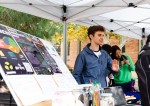The Renewable Energy Association’s SWAP Meet will unite thrifty bargain-seekers.
In celebration of Waste Awareness Week, the Renewable Energy Association will be collaborating with a variety of other organizations to create informative events for the environmentally minded, including DIY workshops. At Bruin Plaza on Thursday, the SWAP Meet will represent a tangible means of carrying out these envisioned ideals, as well as allow for an affordable way to reuse clothing, said Chirine Chidiac, a team coordinator in the Renewable Energy Association. Students will be able to directly reduce the impact of environmental waste by bringing in items that can be reused or repurposed, such as clothing or school supplies. Chidiac, a third-year civil engineering student, said she hopes the SWAP Meet will encourage students to become more conscientious about their ecological footprint by reusing second-hand items.
“The long-term environmental impact of events like these is to establish a habit of repurposing and reusing,” Chidiac said. “It creates a circular economic system, rather than a linear one where we use something once or twice and throw it away.”
The SWAP Meet, which will happen throughout the day, will consist of several rows of clothing racks, as well as a table designated specifically for non-clothing items — participants can contribute to both. Students may take and leave items as they please in reflection of the free-flow style of the meet – leftover items will be given to the redistribution center Good Clothes Good People. The organization will also have an active donation box throughout Waste Awareness Week in Bruin Plaza, taking into consideration students who cannot attend Thursday’s event.
Unravel, a fashion-oriented sustainability organization at UCLA, will be running clothing “upcycling” workshops during the SWAP Meet, symbolically transitioning from reuse to repurpose. The workshops cater to students who find salvageable clothes at the meet, but know little about the process involved in upgrading used clothes to the latest styles, said Isabel Schulte, a second-year chemistry and neuroscience student and president of Unravel. The organization will provide supplies that students might not otherwise have access to, such as glue guns and sewing machines, and will have representatives offering design and style tips.
“The workshop isn’t meant to be a one-time thing, but aims to teach people transferable skills they can apply for the rest of their lives,” Schulte said. “As college students, we know how difficult it is to access the skills and knowledge needed to eliminate textile waste.”
The repurposing of clothing is particularly pertinent in the wake of the quickly growing fashion industry, Chidiac said. Large companies produce staggering amounts of clothes at a pittance, and sell them in stores for inexpensive prices that threaten the second-hand market, she said. Many corporations present fleeting fashion trends that dissipate within a season, causing massive amounts of unsold clothes to be exported to developing nations, wreaking havoc on their economies. The SWAP Meet is a small-scale step in combating a large-scale issue.
Chidiac also said mass-produced fashion leads to high transportation and storage costs that are taxing on the environment. The SWAP Meet hopes to enlighten students about how their efforts can contribute toward energy conservation. Representatives will be present to help calculate how much water and energy each student has saved. These calculations, though simple, will show students their direct impact from participating in the event, said Ryan Condensa, a third-year chemical engineering student and president of the Renewable Energy Association.
“When we take a big picture of what we’re doing to our environment, everything is ending up in a landfill eventually,” Condensa said. “By becoming consciously aware of how these strains work in all these different sectors, we can start to make changes to the system.”
The meet will concurrently be holding DIY workshops on the opposite end of Bruin Plaza, hosted by E3, an organization that has previously taught workshops on making DIY candles and deodorant. Condensa said these events are meant to challenge the idea of manufacturing and the hyper-packaging consumers are accustomed to, allowing people to create products in bulk without an excess of plastic and paper.
Condensa said he points to companies like Lush who are taking steps to implement these environmentally conscious ideals, paving the way for a less waste-oriented culture. Events like the SWAP Meet, Chidiac said, allow for people to engage in reducing waste on a smaller scale, but are precursors for the founding of sustainable brands and a more ecologically-sound future.
“I want to emphasize the collaborative aspect of the SWAP Meet and show it’s not just a one time event,” Chidiac said. “It’s an event that is meant to shed light upon different issues of sustainability in hopes that students will carry these lessons with them long after the event is done.”
